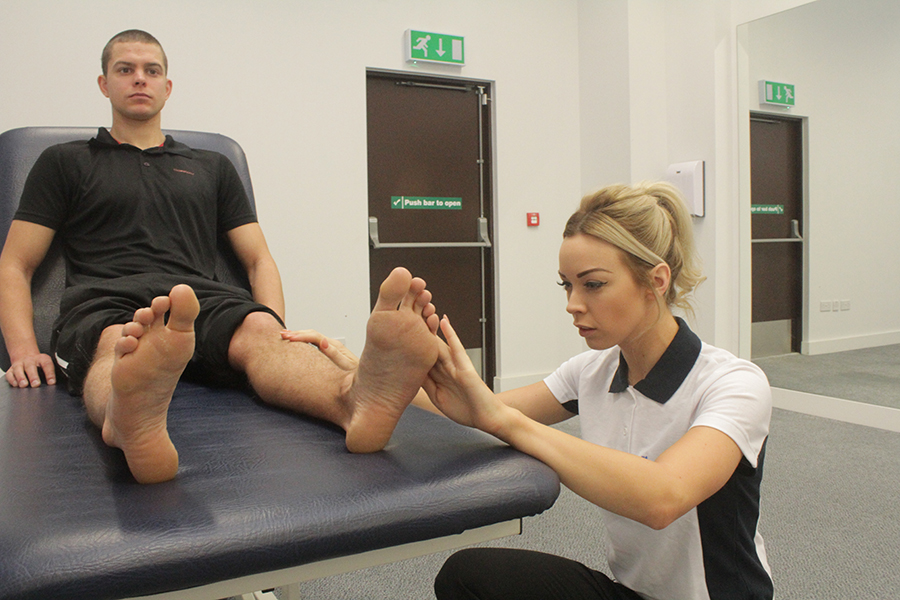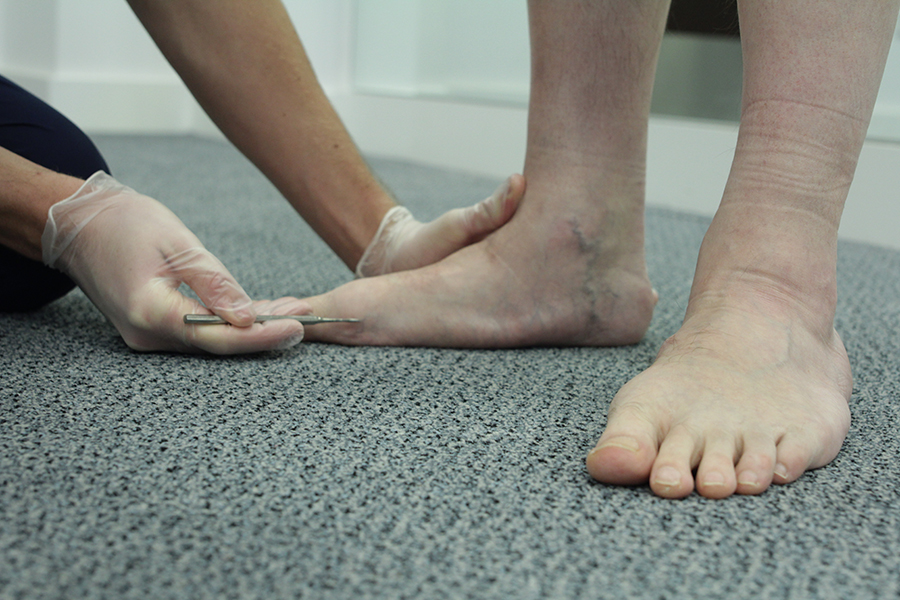Plantar fibroma
Plantar fibroma is the name given to a benign lump underneath the skin on the sole of the foot. Benign means that the lump is not cancerous. A plantar fibroma is not harmful, however, it can be painful when pressure is applied, making walking and standing uncomfortable.
A plantar fibroma is a mass of fibrous tissue and collagen. In the foot a plantar fibroma is found in the plantar aponeurosis, which is a thick fibrous band on the sole of the foot that helps to support the arch.
A plantar fibroma will typically appear alone, however, it is possible to have more than one fibroma at a time, in either one, or both feet.
The cause of plantar fibromas is not well understood, although trauma to the area is thought to be the most common cause. Other causes may include:

The signs and symptoms of a plantar fibroma include:
One of our podiatrists will be able to diagnose whether what you have is a plantar fibroma. It is important to visit a podiatrist so that other conditions can be ruled out.
Podiatry for a plantar fibroma would consist of a thorough medical and social history. Once a diagnosis of plantar fibroma has been made one of our podiatrists will discuss with you possible treatment options. The aim of treatment for plantar fibroma is to reduce the painful symptoms caused by the fibroma.
It is not possible to remove the fibroma without surgery, however, this should be a last resort reserved only for the most severe cases. This is because it is common for plantar fibromas to re-occur after surgery. The treatments for plantar fibroma may include:

A plantar fibroma is a benign lump underneath the skin on the bottom of the foot that has formed from fibrous tissue and collagen. A plantar fibroma can be very painful, especially when pressure is applied. This means that everyday activities such as walking and standing can be uncomfortable. The exact cause of plantar fibroma is unknown, however, trauma is thought to be the most common cause.
If you have a plantar fibroma you should visit one of our podiatrists who will be able to provide advice and treatment that will help ease the painful symptoms caused by the fibroma.
To arrange an assessment with one our podiatrists please email office@chiropody.co.uk or call 0330 088 4222.
What is a plantar fibroma?
A plantar fibroma is a mass of fibrous tissue and collagen. In the foot a plantar fibroma is found in the plantar aponeurosis, which is a thick fibrous band on the sole of the foot that helps to support the arch.
A plantar fibroma will typically appear alone, however, it is possible to have more than one fibroma at a time, in either one, or both feet.
What causes a plantar fibroma?
The cause of plantar fibromas is not well understood, although trauma to the area is thought to be the most common cause. Other causes may include:
- Certain medications
- Genetics
- Epilepsy
- Diabetes
- Hypothyroidism
- Cirrhosis of the liver

What are the signs and symptoms of a plantar fibroma?
The signs and symptoms of a plantar fibroma include:
- A firm nodule under the foot in the arch
- Pain when pressure is applied (walking and standing)
- Pain at all times, that increases when pressure is applied
How is a plantar fibroma diagnosed?
One of our podiatrists will be able to diagnose whether what you have is a plantar fibroma. It is important to visit a podiatrist so that other conditions can be ruled out.
What would podiatry for a plantar fibroma involve?
Podiatry for a plantar fibroma would consist of a thorough medical and social history. Once a diagnosis of plantar fibroma has been made one of our podiatrists will discuss with you possible treatment options. The aim of treatment for plantar fibroma is to reduce the painful symptoms caused by the fibroma.
It is not possible to remove the fibroma without surgery, however, this should be a last resort reserved only for the most severe cases. This is because it is common for plantar fibromas to re-occur after surgery. The treatments for plantar fibroma may include:
- Orthoses
- Padding
- Stretching Programmes
- Advice and education
- Footwear review
- Steroid injections
- Surgery

Summary
A plantar fibroma is a benign lump underneath the skin on the bottom of the foot that has formed from fibrous tissue and collagen. A plantar fibroma can be very painful, especially when pressure is applied. This means that everyday activities such as walking and standing can be uncomfortable. The exact cause of plantar fibroma is unknown, however, trauma is thought to be the most common cause.
If you have a plantar fibroma you should visit one of our podiatrists who will be able to provide advice and treatment that will help ease the painful symptoms caused by the fibroma.
To arrange an assessment with one our podiatrists please email office@chiropody.co.uk or call 0330 088 4222.
Save 5% by booking an appointment online.

Find your nearest clinic
We have clinics located throughout the North West. We also provide a home visit service.
Find out more »

No waiting lists!
Tired of waiting for treatment? Be seen by a podiatrist today!
Find out more »

Not sure how we can help?
Speak to a podiatrist to find out how we can help. Call us on 0330 088 4222.
Find out more »
We work with:

Individuals

Organisations

Health professionals
Get in Touch!
0330 088 4222
If you would like to speak to one of our specialists then please complete this form.
We are open 7 days a week








